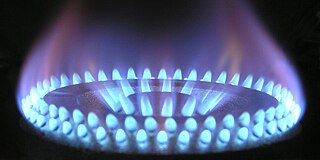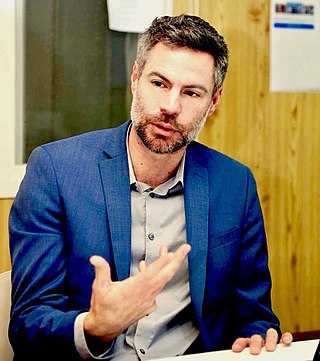
Natural gas is a naturally occurring mixture of gaseous hydrocarbons consisting primarily of methane (97%) in addition to various smaller amounts of other higher alkanes. Low levels of trace gases like carbon dioxide, nitrogen, hydrogen sulfide, and helium are also usually present. Methane is colorless and odorless, and the second largest greenhouse gas contributor to global climate change after carbon dioxide. Because natural gas is odorless, odorizers such as mercaptan are commonly added to it for safety so that leaks can be readily detected.

The Natural Resources Defense Council (NRDC) is a United States-based 501(c)(3) non-profit international environmental advocacy group, with its headquarters in New York City and offices in Washington D.C., San Francisco, Los Angeles, Chicago, Bozeman, India, and Beijing. The group was founded in 1970 in opposition to a hydro-electric power power plant in New York.

Électricité de France S.A., commonly known as EDF, is a French multinational electric utility company owned by the government of France. Headquartered in Paris, with €139.7 billion in sales in 2023, EDF operates a diverse portfolio of at least 120 gigawatts of generation capacity in Europe, South America, North America, Asia, the Middle East, and Africa.
Environmental Defense Fund or EDF is a United States-based nonprofit environmental advocacy group. The group is known for its work on issues including global warming, ecosystem restoration, oceans, and human health, and advocates using sound science, economics and law to find environmental solutions that work. It is nonpartisan, and its work often advocates market-based solutions to environmental problems.

Landfill gas is a mix of different gases created by the action of microorganisms within a landfill as they decompose organic waste, including for example, food waste and paper waste. Landfill gas is approximately forty to sixty percent methane, with the remainder being mostly carbon dioxide. Trace amounts of other volatile organic compounds (VOCs) comprise the remainder (<1%). These trace gases include a large array of species, mainly simple hydrocarbons.

The energy policy of the United States is determined by federal, state, and local entities. It addresses issues of energy production, distribution, consumption, and modes of use, such as building codes, mileage standards, and commuting policies. Energy policy may be addressed via legislation, regulation, court decisions, public participation, and other techniques.

EDF Energy is a British integrated energy company, wholly owned by the French state-owned EDF, with operations spanning electricity generation and the sale of natural gas and electricity to homes and businesses throughout the United Kingdom. It employs 11,717 people, and handles 5.22 million business and residential customer accounts.

The United States produced 5.2 billion metric tons of carbon dioxide equivalent greenhouse gas (GHG) emissions in 2020, the second largest in the world after greenhouse gas emissions by China and among the countries with the highest greenhouse gas emissions per person. In 2019 China is estimated to have emitted 27% of world GHG, followed by the United States with 11%, then India with 6.6%. In total the United States has emitted a quarter of world GHG, more than any other country. Annual emissions are over 15 tons per person and, amongst the top eight emitters, is the highest country by greenhouse gas emissions per person. However, the IEA estimates that the richest decile in the US emits over 55 tonnes of CO2 per capita each year. Because coal-fired power stations are gradually shutting down, in the 2010s emissions from electricity generation fell to second place behind transportation which is now the largest single source. In 2020, 27% of the GHG emissions of the United States were from transportation, 25% from electricity, 24% from industry, 13% from commercial and residential buildings and 11% from agriculture. In 2021, the electric power sector was the second largest source of U.S. greenhouse gas emissions, accounting for 25% of the U.S. total. These greenhouse gas emissions are contributing to climate change in the United States, as well as worldwide.
Citizens for Pennsylvania's Future (PennFuture) is a nonprofit environmental advocacy organization based in Harrisburg, Pennsylvania, United States. As of 2021, the organization has five offices across Pennsylvania: Philadelphia, Pittsburgh, Harrisburg, Mt. Pocono and Erie.

Michael D. Shellenberger is an American author and journalist who writes about politics, the environment, climate change, and nuclear power. He is a co-founder of the Breakthrough Institute and the California Peace Coalition. Shellenberger founded the pro-nuclear non-profit Environmental Progress in 2016.
"Drill, baby, drill!" was a 2008 Republican campaign slogan first used at the 2008 Republican National Convention by former Maryland Lieutenant Governor Michael Steele, who was later elected Chairman of the Republican National Committee. The slogan expressed support for increased drilling for petroleum and gas as sources of additional energy and gained further prominence after it was used by Republican vice presidential nominee Sarah Palin during the vice-presidential debate. Former President Donald Trump used the phrase in response to a voter question during a CNN presidential townhall on May 11, 2023.

The American Clean Energy and Security Act of 2009 (ACES) was an energy bill in the 111th United States Congress that would have established a variant of an emissions trading plan similar to the European Union Emission Trading Scheme. The bill was approved by the House of Representatives on June 26, 2009, by a vote of 219–212. With no prospect of overcoming a threatened Republican filibuster, the bill was never brought to the floor of the Senate for discussion or a vote. The House passage of the bill was the "first time either house of Congress had approved a bill meant to curb the heat-trapping gases scientists have linked to climate change."
The climate change policy of the United States has major impacts on global climate change and global climate change mitigation. This is because the United States is the second largest emitter of greenhouse gasses in the world after China, and is among the countries with the highest greenhouse gas emissions per person in the world. In total, the United States has emitted over a trillion metric tons of greenhouse gasses, more than any country in the world.
Nathaniel O. Keohane is an American environmental economist who serves as president at the Center for Climate and Energy Solutions (C2ES).

The environmental policy of the Donald Trump administration represented a shift from the policy priorities and goals of the preceding Barack Obama administration. Where President Obama's environmental agenda prioritized the reduction of carbon emissions through the use of renewable energy with the goal of conserving the environment for future generations, the Trump administration policy was for the US to attain energy independence based on fossil fuel use and to rescind many environmental regulations. By the end of Trump's term, his administration had rolled back 98 environmental rules and regulations, leaving an additional 14 rollbacks still in progress. As of early 2021, the Biden administration was making a public accounting of regulatory decisions under the Trump administration that had been influenced by politics rather than science.

Gas venting, more specifically known as natural-gas venting or methane venting, is the intentional and controlled release of gases containing alkane hydrocarbons - predominately methane - into Earth's atmosphere. It is a widely used method for disposal of unwanted gases which are produced during the extraction of coal and crude oil. Such gases may lack value when they are not recyclable into the production process, have no export route to consumer markets, or are surplus to near-term demand. In cases where the gases have value to the producer, substantial amounts may also be vented from the equipment used for gas collection, transport, and distribution.
Global Energy Monitor (GEM) is a San Francisco–based non-governmental organization which catalogs fossil fuel and renewable energy projects worldwide. GEM shares information in support of clean energy and its data and reports on energy trends are widely cited by governments, media, and academic researchers.

Routine flaring, also known as production flaring, is a method and current practice of disposing of large unwanted amounts of associated petroleum gas (APG) during crude oil extraction. The gas is first separated from the liquids and solids downstream of the wellhead, then released into a flare stack and combusted into Earth's atmosphere. Where performed, the unwanted gas has been deemed unprofitable, and may be referred to as stranded gas, flare gas, or simply as "waste gas". Routine flaring is not to be confused with safety flaring, maintenance flaring, or other flaring practices characterized by shorter durations or smaller volumes of gas disposal.
MethaneSAT is an American-New Zealand space mission launched in 2024 aboard SpaceX's Transporter 10 rideshare mission. It is an Earth observation satellite that will monitor and study global methane emissions in order to combat climate change. The spacecraft will carry a high performance spectrometer methane sensing system, which will allow the spacecraft to take high resolution measurements of global methane emissions from roughly 50 major regions across Earth.

The environmental policy of the Joe Biden administration includes a series of laws, regulations, and programs introduced by United States President Joe Biden since he took office in January 2021. Many of the actions taken by the Biden administration reversed the policies of his predecessor, Donald Trump. Biden's climate change policy focuses on reducing greenhouse gas emissions, as under the Obama administration. The main climate target of the Biden administration is to reduce greenhouse gas emissions by the United States to net zero by 2050. John Kerry leads the effort as Special Envoy for Climate. Biden promised to end and reverse deforestation and land degradation by 2030.













